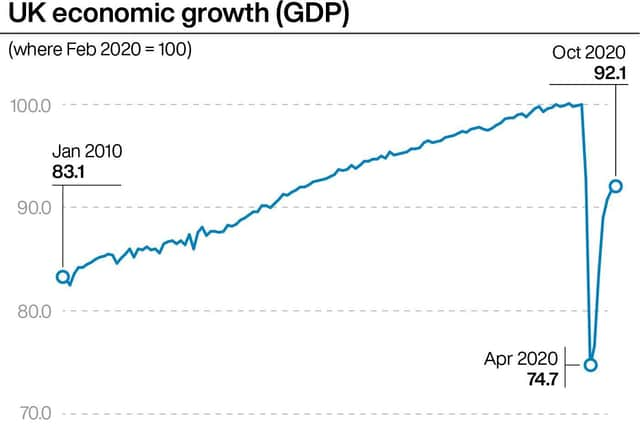Failure to reach trade deal with EU 'will damage economy more than Covid' - finance chiefs
If the UK decides to operate using World Trade Organisation (WTO) rules with the European Union, its largest trading partner, from January 1 2021, then official figures forecast that two per cent will be wiped off the economy next year as a result.
While Prime Minister Boris Johnson has claimed Britain can prosper under an “Australia” style relationship with Brussels – Downing Street shorthand for no-deal - finance chiefs disagree, warning of long-term economic damage that would eclipse even that caused by coronavirus.
Advertisement
Hide AdAdvertisement
Hide AdIn stark comments last month, Bank of England governor Andrew Bailey told MPs on the Treasury Select Committee: “I think the long-term effect would be larger than the long-term effect of Covid.


“The models would suggest that the effects of a WTO no-deal trade agreement are longer term.
“The reason for that is that it takes a lot longer period of time for the real economy to adjust.”
Now the Office for Budget Responsibility (OBR) has forecast that a no-deal scenario would lower gross domestic product (GDP) – the main marker of the health of the economy – by 2 per cent in 2021, a drop that would come on top of the fiscal impact wrought by Covid-19.
Advertisement
Hide AdAdvertisement
Hide AdInvestec’s chief economist, Philip Shaw, told the PA news agency that if the prediction proved correct, it would be equivalent to the economy sinking by £45 billion next year.


According to Chancellor Rishi Sunak, coronavirus is expected to leave “long-term scarring”, meaning in 2025, the economy will be around 3 per cent smaller than expected in the March Budget, even before the effects of no-deal are felt.
Employment would also suffer in the event of a no-deal outcome, it suggested, with the OBR forecasting that unemployment will peak at 8.3 per cent in the third quarter of 2021 if there is no agreement.
The stark warning comes after official statistics showed UK economic growth slowed sharply in October as restrictions were tightened to control the spread of a relentless second wave of Covid-19. The Office for National Statistics (ONS) said gross domestic product (GDP) rose 0.4 per cent month on month in October, marking the sixth month in a row of recovering output from the nadir of the recession in April.
Advertisement
Hide AdAdvertisement
Hide AdBut growth pared back significantly from 1.1 per cent in September as new restrictions were brought in to try to curb rising cases of coronavirus, hitting pubs and restaurants hard.


The ONS added that the economy still remains 7.9 per cent below pre-pandemic levels and experts are predicting GDP will slam back into reverse in November and the final quarter of 2020 due to the second national lockdown in England.
Nitesh Patel, Strategic Economist at Yorkshire Building Society, said that the key to reversing the decline in the nation’s finances lay in ensuring an orderly Brexit and in successfully rolling out the vaccine for Covid-19.
Mr Patel said: “Hope is on the horizon - a successful roll-out of an effective vaccine to a large part of the population could also be an economic panacea, enabling social distancing measures to be removed, and aiding confidence and growth. But as always with the economy, there are huge uncertainties.
“Both the success of the vaccination programme and an orderly Brexit will be crucial in terms of the economic health of the nation in 2021.”
Comment Guidelines
National World encourages reader discussion on our stories. User feedback, insights and back-and-forth exchanges add a rich layer of context to reporting. Please review our Community Guidelines before commenting.